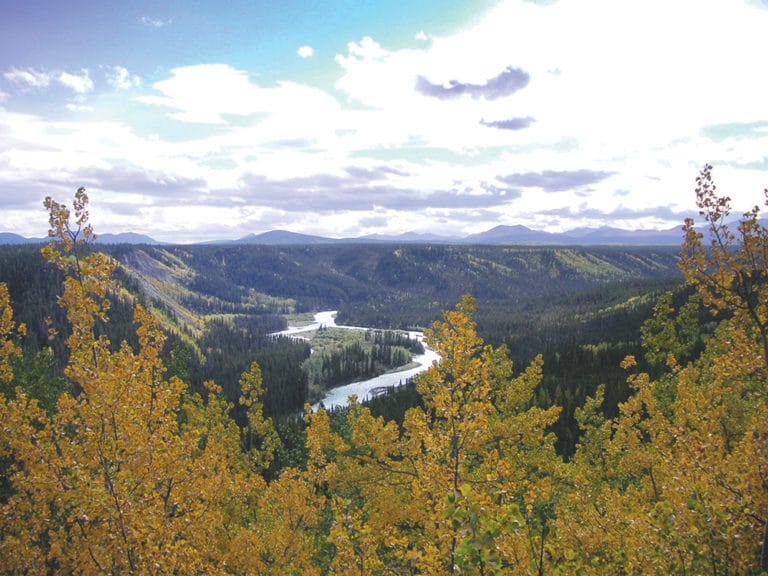By Tikaan Galbreath, Ahtna shareholder descendant

Six years ago, I received a gift of Alaska wormwood seeds (Artemisia Tilesii); I haphazardly threw them into the soil in the darkest, coldest and most unplanted corner of my yard. “Alaska plants are resilient,” I told myself. Not only did the wormwood germinate and grow, it is now prolific. Claiming and spreading throughout the entire corner, it has found a way to the sun. Today the plants gift me with medicine enough to share with family and friends, offering aid in healing gastrointestinal issues as a tea and as a compress soothing skin cuts and sores. Each year it returns more vibrant than the last. I am grateful for the contributions the wormwood has made to my life and to the little urban homestead I call home. As a direct result of it arriving in my life and choosing to stay, I can say: I know this plant.
Whether it is birch sap to break up spring; morels, nettles, or twisted stalk to welcome summer; salmon in July; berries and mushrooms in August; or game meat and wild roots to sustain us through winter, the bounty Alaska provides is unique. Unlike so many other places in this modern world, Alaska’s ecosystem is still intact enough that it sustains the integration of human life. Still, I struggle to find balance between a cultural and spiritual drive to be connected to and sustained by the land, and my current truth of living in a city. I endure the systemic changes happening on a global scale and seek to understand how my life intersects with it all. At the cross-section of my family’s traditions and modern day living, I have found food.
My name is Silas Tikaan Galbreath, of the Athabascan people, from the Ahtna region, and part of the Tsisyu Clan. Raised between two identities, my childhood and adolescent years were spent in Fairbanks and the village of Mentasta Lake; in both places, I was raised in the woods.
“I learned to respect my Elders, question reality and practice kindness.”
In the woods, I learned many lessons; I learned to slow down, listen and breathe. The woods invited me to imagine the fantastical possibilities present in life when we ground ourselves in the tangible reality and nature of things. They reminded me that great things come from determined persistence, patience and a willingness to adapt. In my community, I learned many lessons. I learned to respect my Elders, question reality and practice kindness. My community invited me to challenge the status quo and explore the systemic allegories not yet discovered. It reminds me that life is defined by experiences, that society is collectively prescribed and that we are the stories we tell ourselves. Between the two, as I seek understanding through balance, I know nothing stands alone, all things are connected, and I must integrate my ambitions into the shared vision of my community. In both, I found myself in relationships full of reciprocity, trust and an unwavering commitment to knowing the other.
Despite an active intention of connecting with the land, when the numbers are crunched, my relationship to the land is recreational at best. This becomes especially true when I compare my life to the stories of my grandparents and great-grandparents living semi-nomadic lives, traveling between winter camp and summer camp in the Alaska Range. My lifestyle in Anchorage feels far removed from the woods. Yet, from March to October, most hours after work and weekends are filled with plans to be out of doors and frequently focused on food. As I have made my house a home over the years, one of the most important elements is a freezer full of Alaska’s bounty.
Harvesting from the land brings me moments of quiet contemplation and fitful elation. It is a practice that roots me to tradition. It provides me a direct connection to the earth, to the place I call home and it sustains me holistically: mind, body and spirit. But, it hasn’t always been this way. In the early years of filling my freezer, there were times when I found myself gathering from places that I did not know, that didn’t know me. The lack of connection left me pondering on reciprocity. I recognize now that while I was engaging with the traditions of my ancestors, harvesting the same food that sustained them for thousands of years, I was doing it in a different way. In some of the places I was harvesting (for example, the secret berry
patch just outside of Anchorage, over the hill and to the left of the stream) I lacked the ability to give back.
EDITOR’S NOTE: This article was first published in the Fall 2018 issue of First Alaskans Magazine
